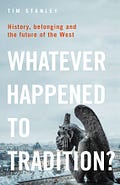A Conversation With Tim Stanley
On Covid restrictions in Britain, institutional hypocrisy, and the conservative conflict over the West.
Welcome to 2022! And a particular welcome to new subscribers. For those of you who are paying subscribers, this new year should bring increased opportunities for interaction and back and forth. For starters, I intend to start a book club within the coming weeks, with regular Zoom sessions for shared discussion… but more on that in short order.
In today’s…
Keep reading with a 7-day free trial
Subscribe to The Transom to keep reading this post and get 7 days of free access to the full post archives.


